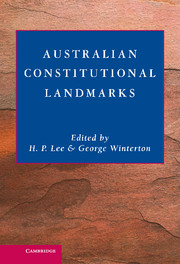Book contents
- Frontmatter
- Contents
- List of Cases
- List of Commonwealth Constitution Provisions
- List of Statutes
- List of Contributors
- Preface
- Introduction: The Commonwealth's Constitutional Century
- 1 The Emergence of the Commonwealth Constitution
- 2 The Engineers Case
- 3 The Uniform Income Tax Cases
- 4 The Bank Nationalisation Cases: The Defeat of Labor's Most Controversial Economic Initiative
- 5 The Communist Party Case
- 6 Fitzpatrick and Browne: Imprisonment by a House of Parliament
- 7 The Boilermakers Case
- 8 The Race Power: A Constitutional Chimera
- 9 The Double Dissolution Cases
- 10 1975: The Dismissal of the Whitlam Government
- 11 The Tasmanian Dam Case
- 12 The Murphy Affair in Retrospect
- 13 The Privy Council and the Constitution
- 14 Cole v Whitfield: ‘Absolutely Free’ Trade?
- 15 The ‘Labour Relations Power’ in the Constitution and Public Sector Employees
- 16 The Implied Freedom of Political Communication
- Index
14 - Cole v Whitfield: ‘Absolutely Free’ Trade?
Published online by Cambridge University Press: 07 October 2011
- Frontmatter
- Contents
- List of Cases
- List of Commonwealth Constitution Provisions
- List of Statutes
- List of Contributors
- Preface
- Introduction: The Commonwealth's Constitutional Century
- 1 The Emergence of the Commonwealth Constitution
- 2 The Engineers Case
- 3 The Uniform Income Tax Cases
- 4 The Bank Nationalisation Cases: The Defeat of Labor's Most Controversial Economic Initiative
- 5 The Communist Party Case
- 6 Fitzpatrick and Browne: Imprisonment by a House of Parliament
- 7 The Boilermakers Case
- 8 The Race Power: A Constitutional Chimera
- 9 The Double Dissolution Cases
- 10 1975: The Dismissal of the Whitlam Government
- 11 The Tasmanian Dam Case
- 12 The Murphy Affair in Retrospect
- 13 The Privy Council and the Constitution
- 14 Cole v Whitfield: ‘Absolutely Free’ Trade?
- 15 The ‘Labour Relations Power’ in the Constitution and Public Sector Employees
- 16 The Implied Freedom of Political Communication
- Index
Summary
The unanimous judgment of the High Court in 1988 in Cole v Whitfield revolutionised the interpretation of the provision in s. 92 of the Constitution that ‘trade, commerce, and intercourse among the States … shall be absolutely free’. The judgment aptly described the previous position as follows:
Over the years the Court has moved uneasily between one interpretation and another in its endeavours to solve the problems thrown up by the necessity to apply the very general language of the section to a wide variety of legislative and factual situations. Indeed, these shifts have made it difficult to speak of the section as having achieved a settled or accepted interpretation at any time since federation.
The actual decision is clearly justifiable. The reasoning has been widely supported, and even praised for being ‘absolutely right’. At the other extreme, the late Sir Garfield Barwick described it as ‘really laughable’ and ‘terrible tosh’. Those two expressions might seem somewhat extreme. However, the reasoning in the judgment does appear to be misconceived, or at least highly questionable, in some major respects. Even if there is no further revolution, the judgments in Cole and the later cases reviewed in this chapter will require substantial clarification.
The previous cases
The applications of s. 92 in the years leading up to Cole were marked by subtle distinctions based on the notion of the ‘criterion of operation’ of an impugned law.
- Type
- Chapter
- Information
- Australian Constitutional Landmarks , pp. 335 - 354Publisher: Cambridge University PressPrint publication year: 2003

